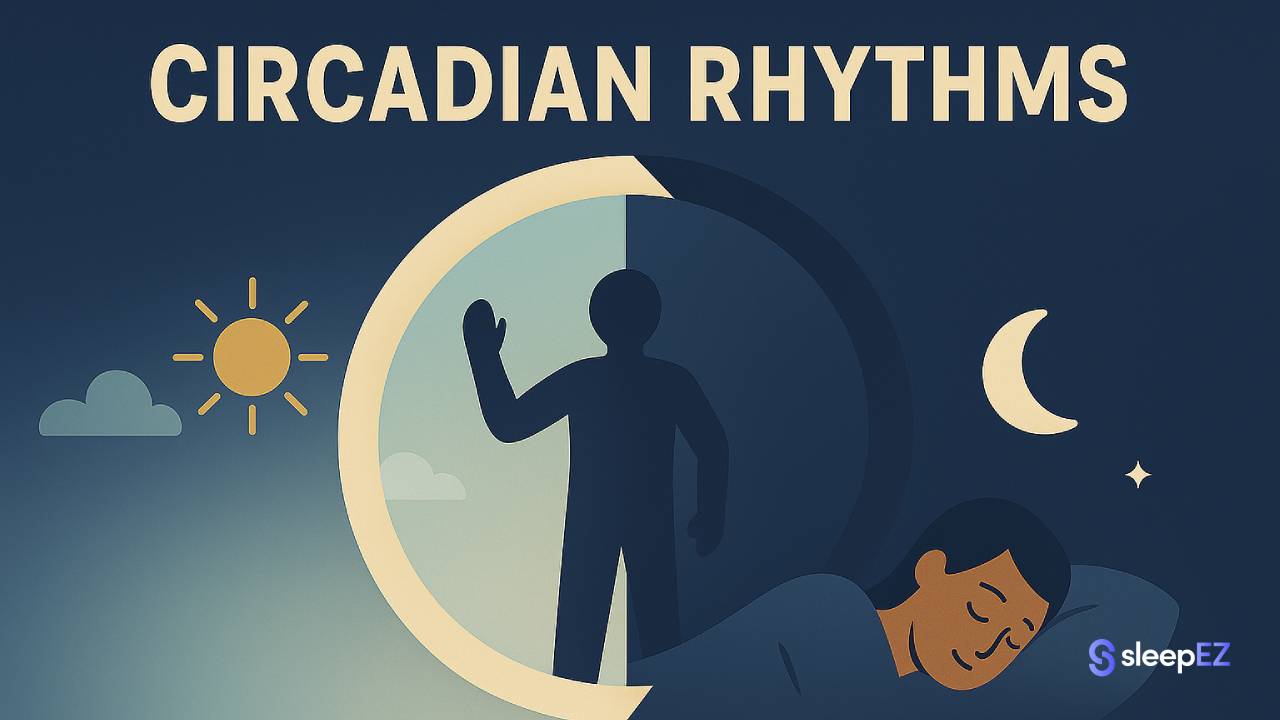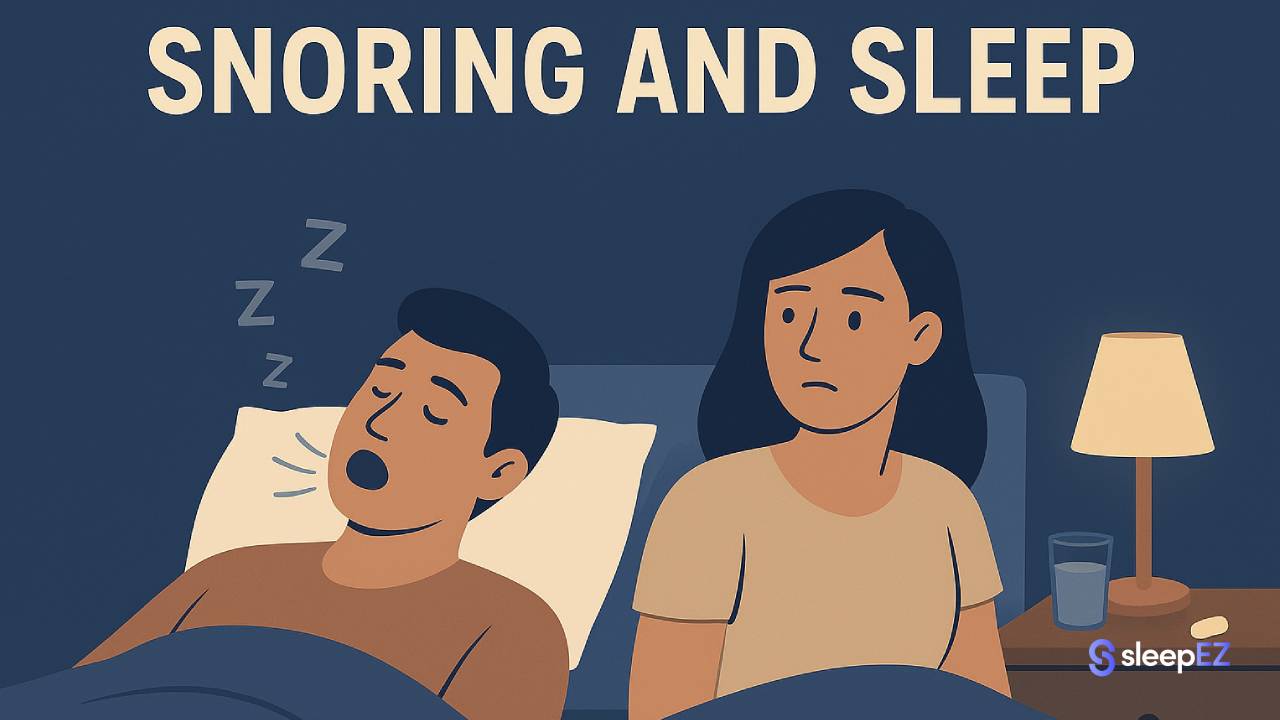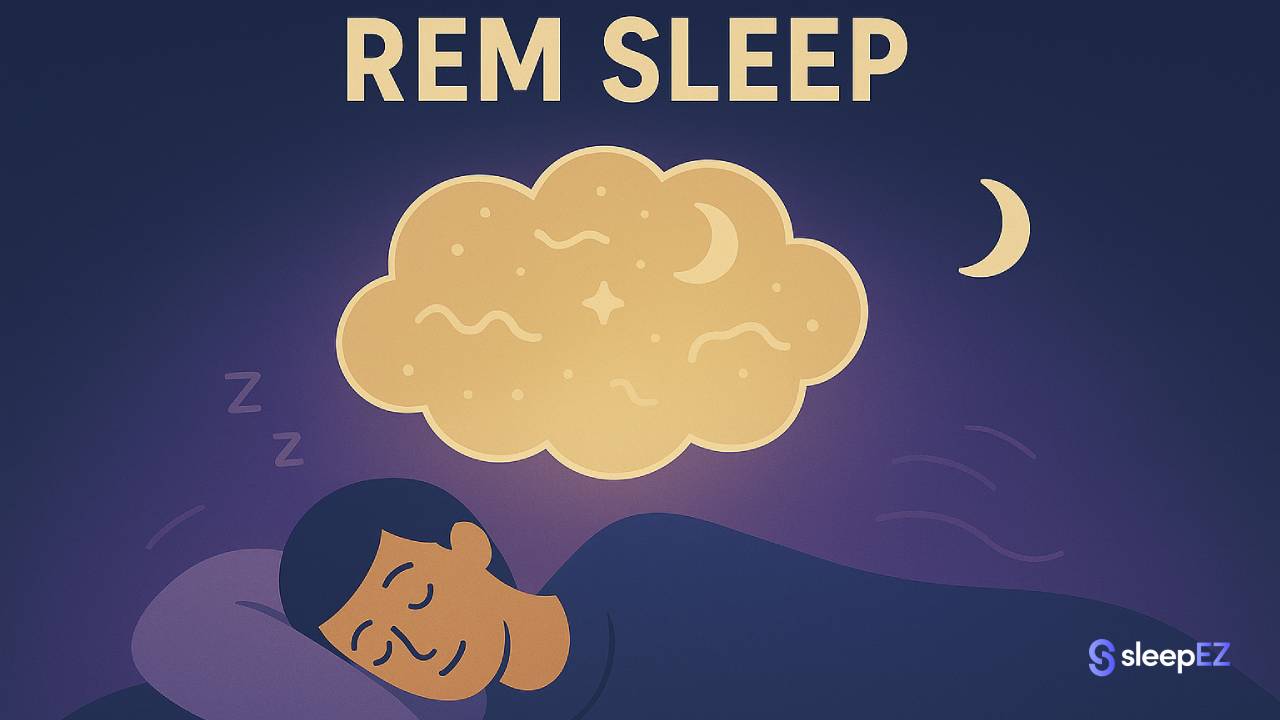Ever wonder why you get sleepy around the same time every night? Or why you hit that afternoon slump no matter how much coffee you drink? Your body has an internal clock that runs these patterns, and it's called your circadian rhythm.
This guide will explain what circadian rhythm is, how it works, what throws it off balance, and most importantly, how to fix it for better sleep and energy.
What Is a Circadian Rhythm?
A circadian rhythm is your body's natural 24-hour cycle. It acts like a master clock, keeping your body's functions on a schedule. It is best known for managing sleep. It also controls other important functions:
- Hormone Release: It tells your body when to release hormones for sleep and alertness.
- Body Temperature: It lowers your temperature at night and raises it in the morning.
- Metabolism: It affects how you digest food.
- Alertness: It controls your daily energy levels.
How Does Your Body's Master Clock Work?
Your circadian rhythm isn't just one thing. It's a complex system that involves your brain, your eyes, and several key hormones working together.
The Conductor: The Suprachiasmatic Nucleus (SCN)
Deep in your brain, there's a tiny cluster of about 20,000 nerve cells called the suprachiasmatic nucleus, or SCN. It sits in the hypothalamus, right above where your optic nerves cross.
The SCN acts like an orchestra conductor. It coordinates all the different biological processes in your body to make sure they happen at the right time. When your SCN gets disrupted, everything else falls out of sync.
The #1 Signal: The Power of Light
Light is the most powerful signal your circadian rhythm responds to.
Here's how it works: Light enters your eyes and travels along the optic nerve to the SCN. This tells your brain whether it's day or night. When your eyes detect light, especially blue light from the sun, your SCN sends signals throughout your body to promote wakefulness. When it gets dark, your SCN triggers a different set of responses that prepare you for sleep.
This is why natural light exposure is so critical for maintaining a healthy internal clock.
The Hormones of Sleep and Wakefulness: Melatonin and Cortisol
Two hormones play starring roles in your circadian rhythm.
Melatonin is your "hormone of darkness." As evening approaches and light fades, your pineal gland starts producing melatonin. This hormone makes you feel drowsy and lowers your body temperature, preparing you for sleep. Melatonin levels stay high through the night and drop in the morning.
Cortisol is often called the stress hormone, but it's also your natural alarm clock. Cortisol levels rise in the early morning hours, peaking around the time you wake up. This hormone increases alertness, raises blood pressure, and gives you energy to start the day. Cortisol gradually decreases throughout the day, reaching its lowest point at night.
When these hormones are properly timed, you feel alert during the day and sleepy at night. When they're out of sync, you feel tired when you should be awake and wired when you should be sleeping.
What Happens When Your Circadian Rhythm Is Off?
Common Causes of Disruption
Several factors in modern life can throw your circadian rhythm out of whack:
- Jet lag: Traveling across time zones faster than your body can adjust
- Shift work: Working nights or rotating shifts
- Blue light at night: Screens from phones, tablets, and computers trick your brain into thinking it's daytime
- Inconsistent sleep schedules: Going to bed and waking up at wildly different times
- Late-night eating: Large meals close to bedtime
- Lack of natural light: Spending all day indoors
- Stress and anxiety: Mental strain can override your natural sleep signals
Signs Your Internal Clock Is Unsynced
If your circadian rhythm is disrupted, you might experience symptoms such as:
- Trouble falling asleep or waking up frequently during the night.
- Daytime sleepiness and fatigue.
- Difficulty concentrating or "brain fog."
- Mood swings, irritability, or feelings of depression.
- Gastrointestinal issues.
These symptoms often overlap, and they can seriously impact your daily life if left unaddressed.
How to Fix and Maintain a Healthy Circadian Rhythm: An Actionable Checklist
You can reset and strengthen your circadian rhythm with consistent daily habits. Here's what actually works.
Get Morning Sunlight (10-15 minutes)
This is the single most powerful action you can take. Get outside within an hour of waking up and expose your eyes to natural light for 10 to 15 minutes. No sunglasses.
Morning sunlight sends a strong signal to your SCN that it's daytime. This stops melatonin production, triggers cortisol release, and sets your internal clock for the day. Even on cloudy days, outdoor light is significantly brighter than indoor lighting.
Can't get outside? Sit by a window or use a light therapy box designed for circadian rhythm support.
Stick to a Consistent Sleep Schedule
Go to bed and wake up at the same time every day. Yes, even on weekends.
Your body craves consistency. When you maintain a regular schedule, your SCN learns when to release sleep and wake hormones. This makes falling asleep and waking up much easier over time.
Irregular sleep patterns confuse your internal clock and make it harder to get quality rest.
Be Smart About Light in the Evening
As sunset approaches, start dimming the lights in your home. This signals to your brain that nighttime is coming.
Two hours before bed, reduce your exposure to screens. If you must use devices, enable night mode or wear blue light blocking glasses. Blue light suppresses melatonin production, which keeps you wired when you should be winding down.
Consider using warm, dim lighting in the evening. Amber or red-toned lights have less impact on melatonin than bright white or blue lights.
Create a Relaxing Bedtime Routine
Develop a consistent pre-sleep routine that helps your body recognize it's time to rest.
Good options include:
- Reading a physical book
- Taking a warm bath or shower
- Gentle stretching or yoga
- Meditation or deep breathing exercises
- Listening to calm music or a sleep podcast
- Journaling
Start your routine at the same time each night. Your body will begin to associate these activities with sleep, making it easier to drift off.
Time Your Meals and Exercise
When you eat matters almost as much as what you eat. Large meals late at night can disrupt your circadian rhythm and interfere with sleep quality. Try to finish dinner at least three hours before bed.
Exercise is excellent for sleep, but timing matters. Intense workouts raise your core temperature and cortisol levels, which can keep you awake. Finish vigorous exercise at least three to four hours before bedtime. Light stretching or walking in the evening is fine.
Create the Perfect Sleep Sanctuary
Your bedroom environment plays a huge role in signaling sleep to your brain. You want a space that's dark, quiet, and cool.
For total darkness: Even small amounts of light can disrupt melatonin production. Install blackout curtains to block outside light. For complete darkness, try a comfortable Bluetooth sleep mask that blocks all light while playing calming audio to help you wind down.
For absolute quiet: Sudden noises can pull you out of deep sleep and fragment your rest. If you need silence, noise-blocking silicone earplugs work well. If you prefer consistent background sound, a hush+ sound machine can mask disturbances with white noise. This creates a stable sound environment that helps maintain deep sleep. (A white noise machine for a baby serves the same purpose, creating consistent sleep conditions for little ones.)
For better breathing: The quality of your breathing affects sleep depth. Mouth tape is a simple tool that encourages nasal breathing during sleep, which can lead to deeper, more restorative rest.
Keep it cool: Your body temperature naturally drops as you fall asleep. A room temperature between 60 and 67 degrees Fahrenheit supports this process.
Common Circadian Rhythm Sleep Disorders
Sometimes circadian rhythm problems become chronic conditions. Here are the most common disorders:
Delayed Sleep Phase Disorder (DSPD): Your internal clock runs later than normal. You can't fall asleep until very late (often 2 a.m. or later) and struggle to wake up at conventional times. This is common in teenagers and young adults.
Advanced Sleep Phase Disorder (ASPD): The opposite problem. You feel extremely sleepy in the early evening (often 6 to 8 p.m.) and wake up very early in the morning (often 2 to 4 a.m.). This is more common in older adults.
Shift Work Sleep Disorder: Working night shifts or rotating schedules conflicts with your natural circadian rhythm, causing chronic sleep problems and daytime fatigue.
Jet Lag Disorder: Temporary misalignment between your internal clock and the new time zone after traveling across multiple time zones.
These conditions can significantly impact quality of life and may require professional treatment.
When to See a Doctor
Consult a healthcare professional if:
- Sleep problems persist for more than a few weeks
- Daytime fatigue interferes with work, relationships, or daily activities
- You suspect you have a circadian rhythm disorder
- You've tried sleep hygiene improvements without success
- You experience symptoms like loud snoring, gasping for air, or long pauses in breathing during sleep
A sleep specialist can conduct tests, diagnose specific disorders, and recommend targeted treatments like light therapy, melatonin supplements, or chronotherapy.
Frequently Asked Questions
What is a simple term for circadian rhythm?
The simplest term is "internal body clock" or "master clock." It's the 24-hour cycle that controls when you feel awake and when you feel sleepy.
How do you know if your circadian rhythm is off?
Common signs include difficulty falling asleep at night, trouble waking up in the morning, excessive daytime sleepiness, poor concentration, mood changes, and feeling out of sync with your normal schedule. If these symptoms persist, your internal clock likely needs adjustment.
What is the best time to sleep for circadian rhythm?
The ideal sleep window aligns with your body's natural melatonin production, which typically starts around 9 to 10 p.m. for most adults. Going to bed between 10 p.m. and 11 p.m. and waking up between 6 a.m. and 7 a.m. works well for many people. However, the most important factor is consistency. Choose a schedule that fits your life and stick to it every day.
Conclusion
Your circadian rhythm is one of the most powerful systems in your body. It controls your sleep, energy, hormones, and overall health. Light is the master controller, and consistency is the key to keeping everything running smoothly.
The good news? You have more control than you think. Morning sunlight, regular sleep times, smart evening habits, and a proper sleep environment can reset and maintain a healthy internal clock. Start with one or two changes and build from there.
Your body knows what to do. You just need to send it the right signals.




Leave a comment
This site is protected by hCaptcha and the hCaptcha Privacy Policy and Terms of Service apply.